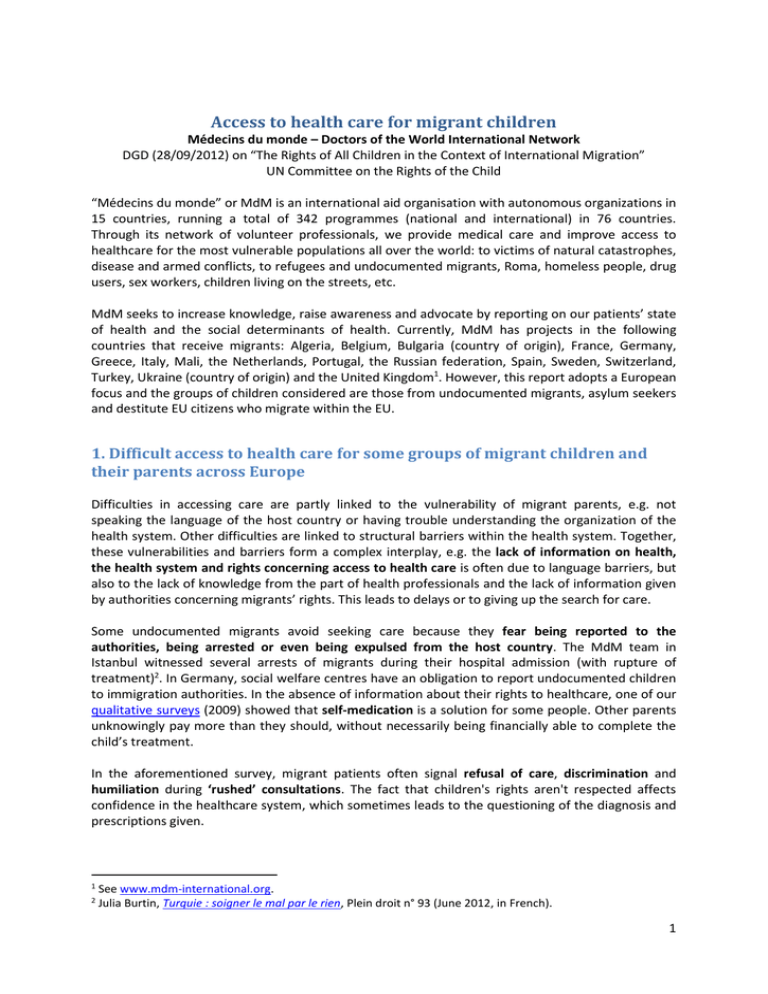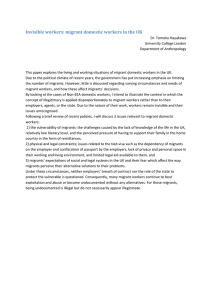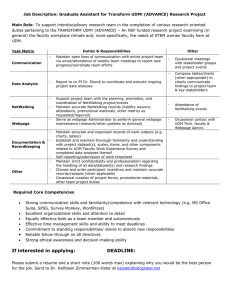Access to health care for migrant children
advertisement

Access to health care for migrant children Médecins du monde – Doctors of the World International Network DGD (28/09/2012) on “The Rights of All Children in the Context of International Migration” UN Committee on the Rights of the Child “Médecins du monde” or MdM is an international aid organisation with autonomous organizations in 15 countries, running a total of 342 programmes (national and international) in 76 countries. Through its network of volunteer professionals, we provide medical care and improve access to healthcare for the most vulnerable populations all over the world: to victims of natural catastrophes, disease and armed conflicts, to refugees and undocumented migrants, Roma, homeless people, drug users, sex workers, children living on the streets, etc. MdM seeks to increase knowledge, raise awareness and advocate by reporting on our patients’ state of health and the social determinants of health. Currently, MdM has projects in the following countries that receive migrants: Algeria, Belgium, Bulgaria (country of origin), France, Germany, Greece, Italy, Mali, the Netherlands, Portugal, the Russian federation, Spain, Sweden, Switzerland, Turkey, Ukraine (country of origin) and the United Kingdom1. However, this report adopts a European focus and the groups of children considered are those from undocumented migrants, asylum seekers and destitute EU citizens who migrate within the EU. 1. Difficult access to health care for some groups of migrant children and their parents across Europe Difficulties in accessing care are partly linked to the vulnerability of migrant parents, e.g. not speaking the language of the host country or having trouble understanding the organization of the health system. Other difficulties are linked to structural barriers within the health system. Together, these vulnerabilities and barriers form a complex interplay, e.g. the lack of information on health, the health system and rights concerning access to health care is often due to language barriers, but also to the lack of knowledge from the part of health professionals and the lack of information given by authorities concerning migrants’ rights. This leads to delays or to giving up the search for care. Some undocumented migrants avoid seeking care because they fear being reported to the authorities, being arrested or even being expulsed from the host country. The MdM team in Istanbul witnessed several arrests of migrants during their hospital admission (with rupture of treatment)2. In Germany, social welfare centres have an obligation to report undocumented children to immigration authorities. In the absence of information about their rights to healthcare, one of our qualitative surveys (2009) showed that self-medication is a solution for some people. Other parents unknowingly pay more than they should, without necessarily being financially able to complete the child’s treatment. In the aforementioned survey, migrant patients often signal refusal of care, discrimination and humiliation during ‘rushed’ consultations. The fact that children's rights aren't respected affects confidence in the healthcare system, which sometimes leads to the questioning of the diagnosis and prescriptions given. 1 2 See www.mdm-international.org. Julia Burtin, Turquie : soigner le mal par le rien, Plein droit n° 93 (June 2012, in French). 1 Even when parents master the language of the host country and are well informed, important legal and administrative barriers remain, particularly for asylum seekers (AS) and even more for undocumented migrants (UDM)3. Not all countries give children of AS / UDM the same rights as national children, for example4: - In Sweden, UDM are explicitly excluded from healthcare unless they pay the total cost. Emergency care is accessible but has to be paid for. Children have the same access to health care as Swedish children only if they have applied for asylum. Undocumented children who haven’t applied have no access to healthcare. Although a political agreement to change this exists, legal implementation will have to be monitored. - In Germany, AS / UDM and their children only have access to care after 48 months of residency. Furthermore, for any medical treatment other than emergency treatment, UDM have to successfully apply for a Krankenschein at a social welfare service in order to be eligible. The obligation by these services to report UDM (including children), however, effectively prevents access to healthcare. - In the UK, anyone (including UDM and AS) should be able to register to the NHS patient list with a GP nearby for primary care. Birth, ante- and postnatal care are classified as secondary care and are therefore not free of charge for UDM. Maternity care is treated, however, as “immediately necessary treatment” and must be provided without delay irrespective of the patient’s residency status or ability to pay. In practice, difficulties regularly arise to register with GP’s because they refuse on grounds of proof of legal residency, passport etc. To register a child with a GP, the parents must usually be registered with the child, which can be an extra problem. - In Belgium, all asylum seekers have the right to material aid, including housing and health care. In practice, every winter, families with children found themselves surviving in the street due to a lack of reception facilities. In 2012, the consequences of the economic crisis on health care systems have only aggravated difficulties. The Spanish Health Reform proposed in April excludes adult UDM from public healthcare (except emergency and maternity care). Although children are not directly affected, the welfare of parents plays an important role in the welfare of their children. The same goes for the extreme and unpunished xenophobic violence towards adult migrants in Greece5. Access to health care was already limited to emergency care for UDM (and only until their condition was stabilised) – now, hospital access requires payment up front. In theory, AS have the same rights as nationals, but applying for asylum is particularly difficult in Greece. 3 See the 2008 PICUM report “Undocumented Children in Europe: Invisible Victims of Immigration Restrictions” for an extensive analysis of undocumented children’s access to education, housing and health care. 4 An extensive overview of de iure and de facto access to care across the EU can be found in our publications at www.huma-network.org and in the 2009 European Observatory report (available in 9 languages). More recently, the EU Fundamental Rights Agency published “Migrants in an irregular situation: access to healthcare in 10 European Union Member States” (2011). 5 See the Human Rights Watch section on Greece. 2 2. Difficult access to prenatal care and vaccination for migrants As a consequence of these barriers, access to prenatal care often lacks as well. 79% of the pregnant women interviewed last year in Amsterdam, London, Munich and Nice6 who were asked if they received antenatal care replied that they did not. A partner of the Antwerp MdM team witnessed the refusal by the local social welfare service to help an undocumented HIV-positive mother who was 20 weeks pregnant get access to antiretroviral therapy and antenatal care, because of their strict interpretation of national laws concerning access to health care (the women slept in the basement of an acquaintance’s barbers’ shop, which allegedly could not be regarded as a residency address). More generally, excessive costs of delivery care pose serious barriers across Europe. 75% of the patients in Amsterdam and 71% of those in Nice said that they did not know where to get their children vaccinated. MdM-France observed that the vaccine coverage of patients visiting their health centers in 2010 varied between 28 and 45% (in function of the vaccine: diphtheria, tetanus, polio, TBC or measles-mumps-rubella). In France, a specific survey with Roma patients showed that their vaccine coverage is even lower. Only 8 % of Roma that were questioned had a personal vaccination card. 92% of the participants remembered having had some vaccination or other one day, without knowing exactly which one7. 3. Difficult living conditions for migrants The right to health is also about the right to live in decent conditions. For UDM, these conditions are often sub-standard. In 2008, MdM’s European Observatory conducted a qualitative survey – in tandem with a statistical survey8 – that focused on the living conditions, health and healthcare use of UDM living in Europe with one or more children. Many of the parents questioned recognised and regretted that their poor living conditions had an effect on both their children's physical and mental health. But in spite of the difficulties encountered, staying in the new host country often means a significantly better future for their children (better access to education, freedom, a chance to escape war or violence) than in the country of origin. Furthermore, seriously ill parents without possibilities for treatment in their country of origin would put their children’s lives at risk in case of a return. Harmful living conditions most often cited in the survey: - Economic difficulties (the inability to work legally), which often give rise to problems with housing. Even when interviewees could count on their social network, lodgings weren't necessarily available or stable. The absence of a residency permit or of pay slips makes access to housing even more difficult. As a result, many found themselves in particularly unhealthy, decaying and overcrowded accommodation. Migrants’ focus on economic survival also often pushes them to delay investing time or money in preventive health care. - Overcrowding means lack of privacy, no quiet space to do homework, not having somewhere to invite friends round. In essence, overcrowding has a very negative impact on the health and development of children and adolescents. A testimony collected by interviewers in Sweden featured parents who overfed their baby so that it didn't wake up the other inhabitants of shared housing – because that would have led to their eviction… 6 Our latest European publication compares the Access to health care for vulnerable groups in the European Union in 2012 in 5 European cities (Amsterdam, Brussels, London, Munich and Nice). 7 See the Observatoire de l’accès aux soins de la mission France 2011 for the full report (in French). 8 Access to healthcare for undocumented migrants in 11 EU countries (2009). 3 - Unhealthy surroundings: e.g. problems with damp and mould, insufficient isolation, exposure to toxic products (e.g. lead paint which can cause poisoning), or problems with household equipment such as heaters or faulty sanitation systems. - Malnourishment due to economic difficulties. Inadequate or insufficient nutrition and the resulting ‘failure to thrive’ is a crucial health determinant. E.g. in Athens, 125 families a week depend on MdM for a monthly food parcel and even more families on baby food. Residential instability Some UDM are forced to move frequently, due to evictions, temporary lodgings with family or institutions or job opportunities that involve relocation. Residential instability leads to stress for children, a lack of familiarity with surroundings, difficulties adapting and can put at risk a medical follow-up. Mental health issues Being an UDM means being forced to “hide”, living under the constant threat of being arrested or separated from loved ones, which leads to a very difficult context for children to grow up in – children are often terrorised about this. Some children are also faced with xenophobia, racism and discrimination. The mental health of adults and their children is often intertwined: in spite of the efforts made by parents to protect their children, their concerns and distress sometimes also affects their children’s mental health. In addition, the social difficulties and language barriers of their parents sometimes place children in a difficult situation when they are forced to play the role of interpreter and intermediary between their parents and the society in which they live, giving them adult responsibilities. 4. The case of Roma communities across Europe During recent years, more and more political attention has been given to the rights of Roma9 communities across Europe: to housing, education, work and… health care. Nevertheless, a panoply of scientific studies10 shows that some Roma groups still - show overall shorter life expectancy, know more premature births and higher infant mortality, have higher rates of diabetes, coronary artery diseases, hypertension, obesity, vitamin deficiencies, malnutrition, anaemia, dystrophy, rickets, lung disease and cancer, as well as measles and TB - children show delayed growth and are significantly more malnourished or victim of respiratory and gastro-intestinal infections due to their bad living conditions. These health problems are clearly linked to poverty and malnourishment, unhealthy living conditions (difficult access to water and sanitary facilities, no possibility for garbage disposal, etc.), lack of education and information (lack of adapted prevention strategies) and not in the least to difficult access to preventive (e.g. vaccination) and curative health care (discrimination, legal barriers towards undocumented Roma). In France, the violent break-down of camps and forced population displacements not only cause psychological trauma, but also the interruption of vital treatment of chronic diseases, vaccine programs, TB treatment, etc. 9 We refer to Roma, Sinti, Kale and related groups in Europe, including Travellers, meaning for it to cover the wide diversity of groups concerned, including persons who identify themselves as “Gypsies”. 10 A bibliographical overview is available – contact Nathalie.Simonnot@medecinsdumonde.net and Frank.Vanbiervliet@medecinsdumonde.net. 4 5. The case of Mayotte Mayotte, an island located in the Comoros archipelago, is a French overseas department, contrary to the three other islands of the archipelago that chose independence in 1975. Free circulation between the four islands (family ties and commercial contacts) had always remained possible until France decided to close the borders in 1995. As a consequence, cousins, fathers and brothers all of the sudden became ‘clandestine’. In 2010, French authorities deported 26 405 persons, of whom 6 400 children, from the island, equalling no less than 13% of the island’s population. The local MdM team11 witnesses frequent deportations of parents, leaving their children unattended to (sometimes even parents of seriously ill children). Contrary to UDM in France, undocumented island residents have no access to State Medical Aid (AME). They have to pay 10€ for a medical consultation and up to 300€ for a delivery – exorbitant amounts given the population’s mean income. Although diseases with very serious and irreversible consequences and infectious diseases are being treated free of charge, the interpretation of ‘emergency care’ is interpreted in the most strict manner, excluding children from care. Furthermore, the aforementioned barriers One day, a 3 month old, prematurely delivered, baby arrived at the to seeking health care (lack of information, MdM health centre in cardiorespiratory arrest. The team managed administrative and linguistic barriers and to save the baby’s life – he was discharged after a stay of a month in fear of being arrested on route to a medical consultation) also apply. The the paediatric intensive care unit. A couple of days after he got home, his situation got worse again. At the time when his mother French High authority for the fight against discrimination and equality (Halde) and noticed this, the authorities were doing controls in the the Defender of Children’s Rights have neighbourhood. Although the health centre was only 500 meters away from her home, she didn’t dare to go out until after the both confirmed these observations12 and controls. The baby died, despite resuscitation efforts… have demanded for urgent changes. Based on 5 286 medical consultations for 2 477 children, MdM-France observes the following: - vaccine coverage is variable across Mayotte and needs improvement - Lack of hygiene and difficult access to water and soap provoke bacterial and parasite infections - In 1 117 children under the age of 5, a considerable number (17.2 %) of them showed a growth deficit due to chronic malnutrition. Conclusion Vulnerable children’s right to health is still all too often ignored across Europe. The situations described in our contribution are in direct contradiction with the Convention on the Rights of the Child: children’s right to non-discrimination, the right to life, survival and development, the right not to be separated from their parents, the right to special treatment, education and care for disabled children as well as, of course, the right to the highest attainable standard of health. Being in good health is a basic condition to be able to exercise all other rights. 11 See the full report (in French), http://www.medecinsdumonde.org/En-France/Observatoire-de-l-acces-auxsoins 12 See the annex to the 2008 rapport (in French): “Regard de la Défenseure des enfants sur la situation des mineurs à Mayotte » – www.defenseurdesenfants.fr/rapports.php. Halde reached its conclusions on the 1st of March 2012 – deliberation 2010-87 (01/03/2010). 5 Annex: recommendations 1. The Committee should ensure that the concerns of children from all vulnerable migrant groups, including children of AS, UDM and destitute intra-EU migrants, are addressed in the Committee’s forthcoming activities, including its General Comment on the right of the child to the enjoyment of the highest attainable standard of health (art. 24) and any outcomes from the Day of General Discussion, and raised during the Human Rights Council discussion day on children’s right to health in March 2013. 2. States should ensure that these children have equal access to all forms of healthcare as nationals, on the whole of their territories. This includes emergency, primary, specialist and preventative care. Legislation should explicitly include the rights of vulnerable migrant children (including undocumented children) to access both preventative and curative healthcare. 3. States should ensure that health professionals have easy access to information and training concerning vulnerable migrant children (rights and administrative procedures concerning access to healthcare, social determinants of health, etc.). States should abolish the duty of reporting migrants that seek medical help, which is counter-productive to an efficient public health policy and in violation to the Convention on the Rights of the Child. 4. States should ensure the protection of vulnerable migrants groups from any form of impact on their health resulting from violence to which they are exposed (violent behaviour from the part of security forces, racist violence, etc.). States should also give priority to eradicating child malnutrition and the resulting ‘failure to thrive’, which is a crucial health determinant. 6

